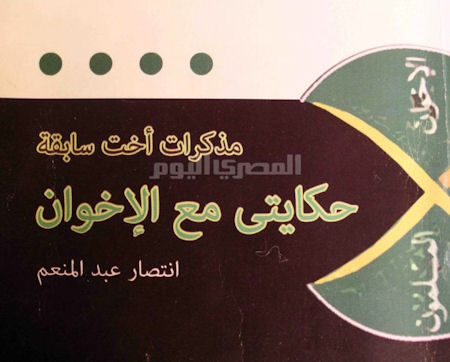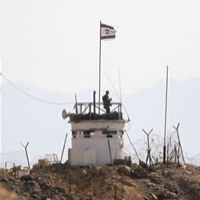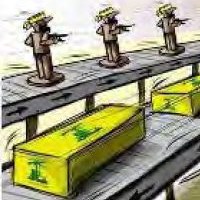![]()
Mon, Jan 16, 2012 | By Crethi Plethi
Ex-Muslim Sister gives insight into Brothers’s Subjugation, Discrimination of Women and Polygamy
In a time when Western intellectuals, politicians, and journalists are trying to explain that the Muslim Brotherhood isn’t a radical Islamist group — but in fact a moderate and democratic political organization — this book featuring the inside account of a former brotherhood member proves otherwise.
The Egyptian independent newspaper Al-Masry Al-Youm published an article today (Jan 16) under the title “In memoir, ex-Muslim Sister paints an unflattering picture” with quotes from Intissar Abdel Moneim’s book in which she accuses the Brotherhood of violating women’s rights.
According to Al-Masry Al-Youm, Abdel Moneim — an Alexandria-based novelist and author — wrote the book with a compelling style and sharp language “exploring the internal politics of the 83-year-old [Muslim Brotherhood] organization and placing special emphasis on the [subjugation and] discrimination against female members.” Abdel Moneim “decries the sisters’ internalization of oppression as women are socialized in a way that compels them to accept male dominance within the organization — and the household” and she condemns “the Brotherhood’s exploitation of the permissibility of polygamy” in Islam.
“One of the areas where the Brothers have exploited the idea of blind obedience and submission is polygamy,” she writes, adding that a brother would take second and third wives for no valid reason. “When the [first] wife complains, a session is held for her where other sisters would remind her of the importance of obedience, patience and submission to God’s will and to [the husband]’s will,” writes Abdel Moneim.
According to the article, Abdel Moneim showed courage in unpacking the writings of Hassan al-Banna — the group’s late founder — and criticizing Banna’s teachings who sought to limit women to “catering to their husbands’ desires and to reproduction.” In the book, Abdel Moneim dismisses Banna’s belief that “there is no need to invest heavily in girls’ education and that women should be trained only to serve as housewives and mothers.” It’s Abdel Moneim’s opinion that this belief is contradictory to true Islam.
“It is true that Islam says that a woman’s primary role is to raise children, but it does not say that this is her only role and that she should not do anything beyond it. Neither the Koran nor the Sunna [Prophet Mohamed’s sayings and deeds] nor the sayings of the prophet’s companions and successors barred her from learning any sciences. The matter has been left for her to decide, according to her needs and circumstances,” she writes.
Abdel Moneim also criticizes Banna’s insistence “that men and women should be separated.” She argues that “Banna’s view portrays humans as if they are mere animals who have little control over their impulses,” according to Al-Masry Al-Youm.
“You cannot by any logic perceive all people as mere female and male sex organs that roam the streets looking for the moment of intercourse like cats,” the book reads. Abdel Moneim attributes Banna’s rigid outlook to his rural background.
This outlook still shapes the group’s perception of women’s roles within the organization and in the society at large. It justifies why the Muslim Sisters’ division cannot operate independently from the Brothers, why no woman is admitted into the group’s highest bodies, namely the Shura Council and the Guidance Bureau, and why the group will not acknowledge a woman’s right to rule, according to the book.
The article goes on to quote Abdel Moneim on how the group’s lust for political power made them [for a while] deviate from this ideology during the lead-up to the 2005 parliamentary elections when it relied heavily on the sisters to campaign for male candidates.
“Nobody was saying then that women should be staying at home, raising children and beautifying themselves for their husbands. … All of a sudden women providing logistical support became crucial,” she writes.
The 2005 parliamentary elections required mobilizing all its resources to win seats. Isn’t this exactly what the Muslim Brotherhood is trying to pull off again: being an Islamist party posing itself as a moderate and democratic party until after the elections [are won]. And who is buying it? Western intellectuals, politicians and journalists!
The book was published during the first post-Hosni Mubarak parliamentary elections in November 2011 with the Muslim Brotherhood and Salafist parties winning a landslide victory at the expense of weakened and divided [secular] liberals. The Muslim Brotherhood is the largest bloc in the People’s Assembly with nearly 40 percent of the seats and are expected to achieve a similar victory in the Shura Council vote scheduled at the end of January.
Since Mubarak’s ouster, the group has strived to assuage concerns about its political and social outlook by claiming that it holds a genuine belief in democracy and equality between all citizens regardless of their faith and gender.
The prospect of an Islamist-Salafist-dominated parliament raises fears among Egyptian liberals about civil liberties, women’s rights and religious freedom in a country with the Middle East’s largest Christian minority. And to prove that the Muslim Brotherhood has embraced democratic norms and rules and relinquished their gender and religious bias, the Brothers fielded both Copts and women on their electoral lists, but — as Al-Masry Al-Youm writes — “these attempts were unable to completely alleviate the fears of liberals and secularists that the group still flirts with a rigid Islamic outlook.”
The author of the book also argues that the Brotherhood’s internal dynamics “is based on nepotism rather than merit” and she refers to her personal experience “recounting that she was not easily admitted into the group because she was not the daughter, the sister or the wife of one of the Muslim Brotherhood’s heroic or wealthy figures,” according to Abdel Moneim.
Of course, the published book caused a stir and as usual in such cases, the Muslim Brotherhood filed a legal complaint against Mohamed El-Baz — journalist at Al-Fagr newspaper — and its editor for running a review of the book that accused the Brothers “of abusing women sexually and politically.”
Mohamed El-Baz had written an article published in tabloid Al-Fagr on Dec.29 under the title “Women for pleasure…The political and sexual exploitation of the Brotherhood women,” featuring the picture of a woman, wearing a full-face veil and holding a banner with the slogan of MB’s political arm, the Freedom and Justice Party, according to the Daily News Egypt.
Yet surprisingly enough, the Brothers didn’t file a complaint against the book’s author. Instead they “sufficed with accusing Al-Fagr of exploiting freedom of the press to libel and slander the group using unprofessional methods that defy the ethics of journalism.”
Although the Muslim Brotherhood is trying to downplay the importance of the book, filing a legal complaint against the tabloid Al-Fagr clearly shows the group is using this case in order to limit the freedom of the Egyptian secular and liberal press who are challenging the Brothers’ so-called Islamic “moderate and democratic views.”
Note: Read also this compelling report on the “intimidation tactics being used against al-Fagr newspaper because of its political approach.”



 RSS
RSS











Ex-Muslim Sister gives insight into Brothers’s Subjugation, Discrimination of Women and Polygamy http://t.co/2G1XwVKR
Ex-Muslim Sister gives insight into Brothers’s Subjugation, Discrimination of Women and Polygamy http://t.co/2G1XwVKR
Ex-Muslim Sister gives insight into Brothers’s Subjugation, Discrimination of Women and Polygamy http://t.co/2G1XwVKR